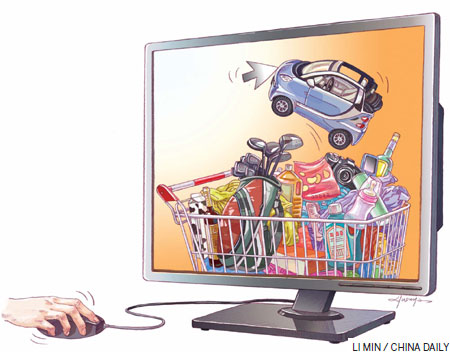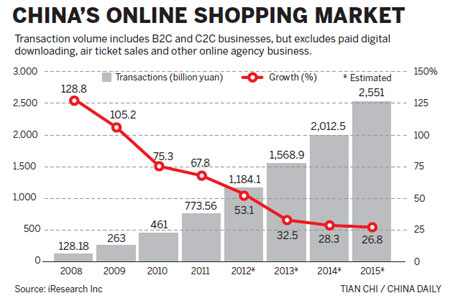Add to cart
Updated: 2012-04-13 08:43
By Lin Jing and Su Zhou (China Daily)
|
||||||||

Growing popularity of online shopping in China is sweet music for multinational firms
Shopping in the fashionable stores of New York, London or Paris may soon be a thing of the past for the Chinese, with online purchases fast changing the dynamics of retail trade. Unlike the popular Western shopping destinations, the online retail market is a new kid on the block, but more importantly, it is the impressive returns being notched up by the sector that is making it a "must-be" market for multinational companies and Western brands.
|
||||
Till recently, the global retail market has been dominated by mega brands with shops/stores in prime locations. Shopping was often an experience that also had the added elements of affluence, travel and holiday built into it.
But all of that is slowly beginning to change as the prolonged financial problems in the Western markets have forced global retailers to increasingly look at China to bolster revenues even as the nation slowly makes a transition from "Made in China" to "Consume in China."
The changing dynamics is clearly visible in the robust double-digit growth during the past few years. More importantly, in what is good news for the retail trade, the future looks bright in China, as demand is set to escalate further on the back of increased spending power and a growing number of affluent people.
The real catalyst for the retail boom in China has been the Internet which has not only given a new meaning to online shopping but also opened up a plethora of opportunities for retailers in what is likely to be the biggest retail market in the world.
German auto major Daimler AG was one of the first major Western companies to realize the potential of online sales. The company's luxury car unit Mercedes-Benz (China) has enjoyed considerable success with its ultra mini car Smart after using the online sales method.
Launched in 2009, the Smart had sales of 11,000 units in China till February this year. The same month, the company teamed up with the Beijing-based Jingdong Mall (360buy.com), a leading business-to-customer (B2C) platform, for online sales of Smart.
Since then, the Pearl Grey limited Smart edition, which costs 149,000 yuan ($23,661, 17,731 euros), has been in the shopping carts of more than 17,200 registered users of Jingdong Mall and enjoyed an online traffic volume of more than 2.27 million. Not surprisingly, on the first day itself, Mercedes-Benz received bookings for all the 300 Smarts it offered online in the first 89 minutes.
Big numbers
It is these kind of massive numbers that is making online shopping in China a phenomenon that cannot be ignored. The total e-commerce market in China reached $1.1 trillion in 2011, up about 46 percent from a year earlier, according to market research firm iResearch.
It also shows that the total online shopping revenue in China for 2011 was 773.56 billion yuan, while in 2010 it was about 461 billion yuan. The online shopping revenue is expected to grow more than 50 percent to 1.18 trillion yuan this year and reach 2.55 trillion yuan by 2015.
According to consultancy Boston Consulting Group (BCG), the share of e-commerce in total retail trade is expected to reach 7.4 percent in China by 2015 from the present 3.3 percent. That indeed is impressive growth, considering that it took the United States nearly 10 years to achieve similar figures.
China is also expected to surpass the US as the largest e-commerce market in the world by then, achieving a compound annual growth rate of 33 percent, and a market size of more than 2 trillion yuan.


 Relief reaches isolated village
Relief reaches isolated village
 Rainfall poses new threats to quake-hit region
Rainfall poses new threats to quake-hit region
 Funerals begin for Boston bombing victims
Funerals begin for Boston bombing victims
 Quake takeaway from China's Air Force
Quake takeaway from China's Air Force
 Obama celebrates young inventors at science fair
Obama celebrates young inventors at science fair
 Earth Day marked around the world
Earth Day marked around the world
 Volunteer team helping students find sense of normalcy
Volunteer team helping students find sense of normalcy
 Ethnic groups quick to join rescue efforts
Ethnic groups quick to join rescue efforts
Most Viewed
Editor's Picks

|

|

|

|

|

|
Today's Top News
Chinese fleet drives out Japan's boats from Diaoyu
Health new priority for quake zone
Inspired by Guan, more Chinese pick up golf
Russia criticizes US reports on human rights
China, ROK criticize visits to shrine
Sino-US shared interests emphasized
China 'aims to share its dream with world'
Chinese president appoints 5 new ambassadors
US Weekly

|

|










